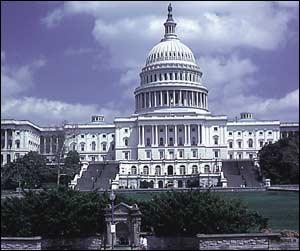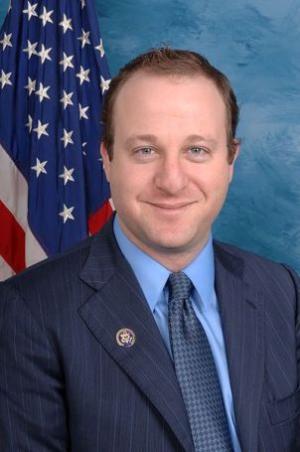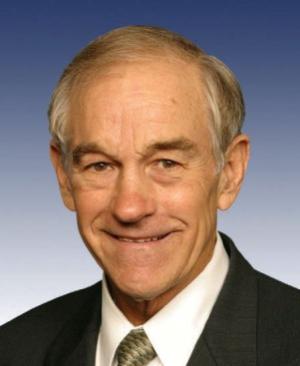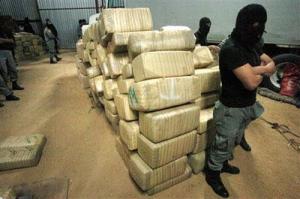A pro-legalization US representative was the keynote speaker at the NORML conference in Denver Saturday. He said we're on the cusp of victory.
Just when you thought Oklahoma couldn't get any more medieval...
Drug legalizing presidential nomination candidates on the right: Gary Johnson and Ron Paul enter the fray.
Cops ripping off drug dealers, cops offering information to drug defendants, sheriffs escorting cartel dope loads, and, oh, yes, prison guards gone bad.
More mass graves have been found, and the gruesome killings continue.
Events and quotes of note from this week's drug policy events of years past.
Although Dutch policy only allows you to possess five grams of marijuana, the high court has ruled that you can still grow five plants, no matter the yield.
America is on the cusp of majority support for marijuana legalization, but legalization is not inevitable and it's up to activists and the multi-billion-dollar marijuana industry to start throwing their weight around to make it happen, US Rep. Jared Polis (D-CO) told an overflow crowd during the keynote address at NORML's 40th annual conference at the Grand Hyatt Hotel in downtown Denver Saturday afternoon.

legalization legislation coming to the Capitol soon
"I am optimistic that we will reach a day when America has the smart, sensible marijuana policy that we deserve," Polis told an attentive audience. "But it could go either way. We could return to the dark ages of repression, or we could be on the eve of a new era of marijuana legalization. Your efforts will help determine which route this country takes and the legacy of this generation of activists on what marijuana policy looks like. Together we can accomplish this," he told the crowd.
Polis said that he would file a marijuana legalization bill this session in Congress. The language was still being developed, he added. He is also working on a bill that would address problems the medical marijuana industry is having with banks, he said.
"Marijuana policy is really coming of age," the businessman turned politician said. "Our Colorado model is very exciting," he added, touting the vibrant local medical marijuana industry on display for conference attendees from across the country. "In my last two elections, even my Republican opponents were for legalization. It's become a very mainstream value here."
That assertion is likely to be put to the test next year. Colorado and national drug reform groups have already announced they plan to put a legalization initiative on the ballot for 2012. A similar initiative in 2006 got 44% of the vote, but that was before the state's medical marijuana boom and its resulting economic impact. While the medical marijuana boom may have created a backlash, its economic benefits could counter that, Polis suggested.
"The marijuana industry here generated $1.7 billion last year and thousands of jobs," he pointed out. "It has created jobs, and jobs in ancillary businesses, it has filled storefronts and filled our alternative newspapers with ads, it has created work for lawyers and accountants, it has created tax revenues. There is a direct nexus to jobs and the economy and deficit reduction," he said.
"We are at a tipping point, on the unprecedented cusp of legalization," Polis told the audience. "The progress at the state level has led the way, but it won't come nationally until it happens in a critical mass of states. Then there comes much more pressure on Congress to legalize and regulate at the national level. Our streets will be safer and our economy stronger."
While no state with the partial exception of Alaska has legalized marijuana, that critical mass could come sooner rather than later. In the best case scenario, the entire West Coast and Colorado could legalize through the initiative process by the end of next year. Meanwhile, legislative efforts at legalization are advancing in New England and the Northeast.
Polis has emerged as one of a handful of US representatives who have publicly supported marijuana legalization or decriminalization. Others include Reps. Barney Frank (D-MA), Peter Stark (D-CA), and Ron Paul (R-TX). While the Obama administration has been arguably sympathetic to medical marijuana -- although recent raids and some US attorneys' statements have raised activists' hackles -- Polis wants a legalization bill to protect patients in medical marijuana states in the event of a less friendly future administration, but to go further as well.

Jared Polis
Polis has demonstrated before that he is not afraid to go public with his anti-prohibitionist views. At the end of last month, he appeared at the National Press Club in Washington, DC, standing alongside representatives of the newly-formed medical marijuana industry lobbying group, the
National Cannabis Industry Association.
"Ending the failed policy of prohibition with regard to marijuana will strike a major blow against the criminal cartels that are terrorizing Americans and Mexicans on both sides of the border," he said at that time.
Polis
wrote a letter to Attorney General Eric Holder last February asking him to ensure the feds complied with its October 19th memo on respecting state law. "Treating drug policy as primarily an issue of public health, as opposed to an issue of criminal justice, is both practical and compassionate and it has been and will continue to be supported by the voters of Colorado," he said then.
Polis is a Democratic progressive, and marijuana legalization fits squarely into a progressive agenda he has created with his
Fearless Campaign, which also emphasizes education reform, immigration reform, food security, net neutrality, and gay, lesbian, and transgender issues.
"Close to half of Americans support legalization, yet progress is Congress is still far away," Polis said Saturday. "That's why I launched the Fearless Campaign. It's really about informing you about what's happening on Capitol Hill and empowering you to speak truth to power. We want the advocacy community tied in. These are transforming issues that are too hot to handle, but too important to ignore. Politicians need to know they're not alone, that you have their backs," he said.
"I think Americans are ready for a serious discussion about tough issues," Polis continued. "Reforming our failed drug policies is a prime example of that. Our policy of marijuana prohibition is a failed policy that doesn’t make our communities safer, while driving legitimate economic activity underground."
Efforts at legalization are growing close to fruition on both coasts, and with representatives like Jared Polis now holding forth in Congress, even that august institution is being infected with the legalization virus. The times, they are a-changing.
back to top
The Oklahoma Senate Wednesday passed a bill that would mandate a sentence of up to life in prison for making hashish out of marijuana. The House has already approved the measure, but it must go back to the lower chamber for a final vote.

Making this could get you life in prison in Oklahoma if a current bill becomes law (Image via Wikimedia.org)
The measure sailed through the Senate with little debate, passing on a vote of 44-2. The House also approved the measure by a large margin, passing it on a vote of 75-18.
The bill,
House Bill 1798, creates a new felony of converting marijuana into hash. A first conviction could garner a $50,000 fine and prison sentence of two years to life. And that's a mandatory minimum two years. Second or subsequent convictions would net doubled penalties.
Oklahoma legislative analysts said the bill would cost the state $56 per day, or more than $20,000 a year, for each day someone is imprisoned. At that rate, if Oklahoma imprisoned five hash makers for 10 years each, the bill to taxpayers would be one million dollars.
The bill was the brainchild of the
Oklahoma Bureau of Narcotics and Dangerous Drugs (OBNDD), which says on its web site that its mission is "to serve the citizens of Oklahoma in the quest for a drug-free state."
According to the
Tulsa World, OBNDD said there have been "few" cases of hash making in the Sooner State. But OBNDD spokesman Mark Woodward said the goal of the bill is to "send a message" that illegal drugs won't be tolerated in Oklahoma.
Neither, apparently, will common sense or a sense of proportionality.
back to top
Two prominent Republican anti-prohibitionists are seeking the nod to head the party's ticket in the 2012 presidential election. Last week, former New Mexico Gov. Gary Johnson formally threw his hat in the ring with a tweet and a speech in New Hampshire, and this week, Rep. Ron Paul (TX) announced he was forming an exploratory committee for the 2012 campaign, with a final decision to come next month.

Former New Mexico Gov. Gary Johnson wants to legalize marijuana. (image via Wikimedia.org)
Both men are libertarian-leaning, anti-interventionist, fiscal conservatives who will compete to gain the support of some of the same elements of the Republican base. Both have long records of speaking out against drug prohibition. They are up against a Republican field that has so far thrown up few strong front runners, and early primary victories could catapult them to the front of the field.
Johnson was in typical form last week, telling
ABC News what he was all about. "I support gay unions. I think the government ought to get out of the marriage business. And then for me as governor of New Mexico, everything was a cost-benefit analysis. There weren't any sacred cows -- everything was a cost-benefit analysis. What are we spending money on and what are we getting for the money that we're spending? So in that sense, the drug war is absolutely a failure."
Drug reform as an issue is prominently displayed on Johnson's campaign home page, and his
drug reform page is worth noting. "Despite our best efforts at enforcement, education and interdiction, people continue to use and abuse illegal drugs," the page says. "The parallels between drug policy today and Prohibition in the 1920's are obvious, as are the lessons our nation learned. Prohibition was repealed because it made matters worse. Today, no one is trying to sell our kids bathtub gin in the schoolyard and micro-breweries aren't protecting their turf with machine guns. It's time to apply that thinking to marijuana. By making it a legal, regulated product, availability can be restricted, under-age use curtailed, enforcement/court/incarceration costs reduced, and the profit removed from a massive underground and criminal economy.
"By managing marijuana like alcohol and tobacco -- regulating, taxing and enforcing its lawful use -- America will be better off," the issue page continues. "The billions saved on marijuana interdiction, along with the billions captured as legal revenue, can be redirected against the individuals committing real crimes against society. Harder drugs should not be legalized, but their use should be dealt with as a health issue -- not a criminal justice issue."
The issues page uses large-font type to ensure that readers understand that he wants to "make marijuana legal" and embraces a harm reduction approach to harder drugs.
Johnson has embraced drug reform since at least 1999, after cruising to victory to serve a second term as New Mexico governor in 1998. That stance made him one of the earliest high ranking officials in the US to call for pot legalization and a harm reduction approach to other drugs. He retired from New Mexico politics after being term-limited out of office after his second term.
Johnson, who is a relative unknown among the Republican field, is counting on a strong showing in New Hampshire, home of the nation's first primary, to boost his candidacy. "I have to do, and want to do, really well in New Hampshire," he said on the steps of the statehouse in Concord as he announced his candidacy. "So I'm going to spend a lot of time in New Hampshire, where you can go from obscurity to prominence overnight with a good showing."

Drug war foe Ron Paul hopes the third time is the charm (house.gov)
Veteran Texas congressman Ron Paul, for his part,
announced Tuesday that he has formed a presidential exploratory committee for the 2012 nomination. If he runs, that would mark his third presidential campaign. He ran as a Libertarian in 1988 and as a Republican in 2008. In the latter campaign, he generated a core of devoted followers, but dropped out in June after averaging less than 10% of the vote in early primaries.
But Paul supporters said their candidate could do better this year. They cited the name recognition from his 2008 run and the rise of the Tea Party, where Paul's fiscally conservative and constitutionalist views, if not always his views toward drug and foreign policy, should find a warm welcome.
Paul has long been a critic of the war on drugs, has supported bills in Congress to decriminalize marijuana and hemp, and takes a states' rights approach to drug policy. He is also strongly anti-interventionist, but unlike many libertarians, opposes abortion.
While both men are long-shots in the Republican nomination process, the state of the field leaves the door open to one or both of them. A recent
CBS News/New York Times poll found that 56% of Republicans were not enthusiastic about any of a long list of declared and potential candidates. (Johnson and Paul weren't listed in that poll).
And then there were two anti-prohibitionist presidential candidates -- in the Republican Party, no less. Maybe there will finally be a serious discussion of drug policy in the 2012 campaign, even if only in the primaries.
(This article was published by StoptheDrugWar.org's lobbying arm, the Drug Reform Coordination Network, which also shares the cost of maintaining this web site. DRCNet Foundation takes no positions on candidates for public office, in compliance with section 501(c)(3) of the Internal Revenue Code, and does not pay for reporting that could be interpreted or misinterpreted as doing so.)back to top
Cops ripping off drug dealers, cops offering information to drug defendants, sheriffs escorting cartel dope loads, and, oh, yes, prison guards gone bad. Here's this week's rogues' gallery:

Prohibition's filthy lucre is hard for some to resist (Image via Wikimedia)
In New York City,
a former NYPD officer pleaded guilty Monday to ripping off at least 100 drug dealers with a gang that scored a million dollars in cash and more than 500 pounds of cocaine during its decade-long spree. Emmanuel Tavarez, 31, an eight-year veteran of the force, used his badge, service weapon, and stolen NYPD raid jackets to stage fake searches of drug dealers and seizure of their stashes along with his co-conspirators. Tavarez went down after a lengthy investigation into the robberies. He now faces up to life in prison after pleading guilty to robbery conspiracy, conspiracy to distribute heroin and cocaine, and using a firearm in the commission of a crime. A dozen of his co-conspirators have charges pending, including four of his in-laws.
In McAllen, Texas,
the former Sullivan City police chief was sentenced April 20 to 10 years in federal prison for his role in protecting Mexican drug traffickers moving two tons of pot through his town. Hernan Guerra, 45, had been arrested at his office last June by FBI agents after they wiretapped his office as part of Operation Deliverance, a massive, nationwide, 430-person bust targeting the cartels. He pleaded guilty to conspiracy to distribute drugs. He faced a minimum of seven years and four months in prison, but his sentencing judge gave him some bonus time for being a crooked cop. He's also got four years of probation to do.
In Tallahassee, Florida,
a Florida prison guard was arrested April 20 on charges he was scheming to sell drugs to prisoners. Guard Janus Isaiah Edwards went down after an inmate snitched him out and corrections and Leon County Sheriff's investigators set him up with undercover officers. Edwards agreed to smuggle in 100 hydrocodone tablets and 11 grams of cocaine in return for $1,000. He is now charged with introduction of drugs to a prison, unlawful compensation, trafficking in hydrocodone, possession of cocaine, and possession with intent to deliver.
In Lebanon, Tennessee,
a Wilson County sheriff's deputy was arrested April 20 for trying to sell information about a federal drug investigation to a target of that investigation in return for $100,000 and a Range Rover. Deputy John Patrick Edwards, 38, had been a member of the FBI's regional drug task force, but lost that gig after being arrested in March on an unrelated theft charge involving his wife and another woman. He was also suspended without pay, leaving him in need of some quick cash. Edwards approached a business partner who knew someone who was a target of the investigation and offered to sell information that could help the target "lessen the blow" and end up with less prison time. But now, Edwards looks to be the one doing prison time; he's looking at 20 years in prison for attempting to obstruct, influence, and impede an official proceeding.
back to top
by Bernd Debusmann, Jr.
Mexican drug trafficking organizations make billions each year smuggling drugs into the United States, profiting enormously from the prohibitionist drug policies of the US government. Since Mexican president Felipe Calderon took office in December 2006 and called the armed forces into the fight against the so-called cartels, prohibition-related violence has killed more than 36,000 people, including more than 15,000 last year. The increasing militarization of the drug war and the arrest or killing of dozens of high-profile drug traffickers have failed to stem the flow of drugs -- or the violence -- whatsoever. The Merida initiative, which provides $1.4 billion over three years for the US to assist the Mexican government with training, equipment and intelligence, has so far failed to make a difference. Here are a few of the latest developments in Mexico's drug war:

The busts keep on coming, but so do the drugs. (Image via Wikimedia.org)
In Cadereyrta, Nuevo Leon,
40 police officers were arrested on suspicion of being in collusion with drug trafficking organizations. The troops were taken into custody by soldiers and federal police officers. The arrests left the town with no municipal police officers and only eight transit police officers.
Thursday, April 21
In Durango,
at least 41 bodies were discovered in a mass grave located near an auto shop in Las Fuentes. The bodies were badly decomposed, suggesting they had been there for some time.
In Tamaulipas,
heavy fighting between rival cartels occurred in the border towns of Miguel Aleman and Ciudad Mier. One gunman was killed, and at least one soldier was killed when the army attempted to intervene. Eleven suspects were taken into custody. The fighting was between the Gulf Cartel and their former enforcers of the Zeta Organization, who were trying to open up the highway from Nuevo Laredo to Miguel Aleman.
Saturday, April 23
In Acapulco,
five women all connected to the same beauty parlor were found with their throats slashed. Three of the dead -- including a 14-year old girl -- were found inside the beauty parlor semi-naked and tied up. Two others were found outside. Mexican media later reported that authorities are looking into connections with prostitution rings, and that the area where the murders took place is well-known for criminal activity.
In Mexico City,
the dismembered body of a woman was found in the extremely upscale neighborhood of San Miguel Chapultepec. The area is adjacent to Chapultepec Park, home to the presidential residence of Los Pinos. Although cartel violence is rare in Mexico City, the city has seen an increase in crime stemming from battles over retail drug turf. Police are also investigating to see whether the crime is connected to the murders in Acapulco.
In Chihuahua, five men were gunned down as they sat under a tree. Two of the dead were brothers, both aged 25. The incident occurred when two luxury SUVs arrived at the location and a group of gunmen attacked the men. The motive is unknown, but Chihuahua has seen high levels of violence between the Sinaloa and Juarez Cartels.
Sunday, April 25
In Tampico,
one person was killed and six wounded in a series of attacks which took place on Easter Sunday. Mexican media reported that most police in the city were busy guarding the tourist areas of the city when the attacks took place. No arrests were made in connection with the incidents.
In Durango,
four Torreon, Coahuila police officers were found executed on the banks of the Nazas River near Gomez Palacio. All four were bound and showed signs of having been tortured before being executed.
In Zihuatanejo, Guerrero, children who were playing
found a body inside a suitcase in front of a bus stop. Inside the suitcase was the body of a woman, Rosa Sotelo Serna, 39, who had been reported missing by her family a month before.
In Los Mochis, Sinaloa,
four men were killed when gunmen attacked a vehicle which took place on the highway between Los Mochis and San Blas. The motive is unknown.
Monday, April 25
In Reynosa,
51 kidnap victims were rescued during an operation by Federal Police. Among those rescued were 6 Chinese citizens, 18 Central Americans, and 27 Mexicans. They were being held captive inside a house in Reynosa.
In Ciudad Juarez,
a disabled man in a wheelchair was shot and killed in a convenience store. An 11-year old girl, the daughter of the store manager, was wounded in the incident when she was shot as she helped the disabled man complete his purchases.
In Durango, the
director of a state penitentiary was ambushed and killed by heavily armed gunmen.
[Editor's Note: Because El Universal has faltered in its weekly body count postings, we have to rely on our own counts, which most likely undercount the actual death toll. Perhaps at some point this year, the Mexican government will again announce an official toll.]
Total Body Count for the Week: *65
Total Body Count for the Year: 2,274
Total Body Count for 2010: 15,273
Total Body Count for 2009: (approx.) 9,600
Total Body Count for 2008 (approx.): 5,400
Total Body Count for 2007 (approx): 4,300
Total Body Count for Calderon's drug war through 2010: 34,849
Total Body Count for Calderon's drug war to date: 37,123
back to top
May 1, 1972: Nobel Prize laureate for economics Milton Friedman is quoted in Newsweek: "Legalizing drugs would simultaneously reduce the amount of crime and raise the quality of law enforcement. Can you conceive of any other measure that would accomplish so much to promote law and order?"
April 30, 1984: Colombian Minister of Justice Rodrigo Lara Bonilla, who had crusaded against the Medellin cartel, is assassinated by motorcycle-riding contract killers. President Belisario Betancur, who had opposed extradition, announces, "We will extradite Colombians." Carlos Lehder is the first to be put on the list. The crackdown forces the Ochoa family, Escobar, and Ãscar RodrÃguez Gacha to flee to Panama for several months. A few months later, Escobar is indicted for Lara Bonilla's murder and the Ochoas and RodrÃguez Gacha named as material witnesses.
May 3, 1994: Dear Abby states publicly in her column that "Just as bootleggers were forced out of business in 1933 when Prohibition was repealed, making the sale of liquor legal (thus eliminating racketeering), the legalization of drugs would put drug dealers out of business. It also would guarantee government approved quality, and the tax on drugs would provide an ongoing source of revenue for drug-education programs."
April 29, 1996: At a speech at a Miami high school, President Clinton calls for a war on drugs -- for the second time. General Barry McCaffrey, the nation's drug czar, told the Cleveland Plain Dealer on May 1 that "everything the president has announced is already being done. There's nothing new here."
May 2, 2001: The Louisiana Senate, voting 29-5, passes sweeping legislation to bring relief to an overflowing state prison system, including ending mandatory prison time for possession of small quantities of drugs.
May 1, 2003: The Illicit Drug Anti-Proliferation Act of 2003 (IDAPA) is signed into law, among other things amending a section of the Controlled Substances Act to target rave organizers. It shifts the statute's emphasis from punishing those who establish places where drugs are made and consumed, such as "crack houses," to those who knowingly maintain "drug-involved premises," including outdoor events such as rock concerts. In addition to the criminal penalties in the original statute, the amended statute adds a civil penalty, thereby lowering the standard of proof from beyond a reasonable doubt to a preponderance of evidence.
back to top
People can grow up to five marijuana plants at home without facing criminal charges, no matter how big the harvest, the Dutch high court ruled Tuesday. But the plants must be handed over to police if they come on an official visit, the court held.

You can grow up to five of these in Holland, no matter the yield, the Dutch high court has held. (image courtesy the author)
The ruling addresses two separate marijuana cultivation cases from 2006 and 2008. In one case, a man was found to have five plants in his garden that yielded nearly five pounds of pot. In the other case, a couple was found with five plants yielding nearly 12 pounds.
Prosecutors had argued that the large harvests violated regulations that allow individuals to possess up to five grams of marijuana for their own use.
It is unclear what the cultivators intended to do with their harvests. Under Dutch policy, licensed coffee shops can sell pot to customers, but the policy makes no provision for growing pot for the coffee shops to sell. A significant black market has grown up to supply the coffee houses.
back to top








